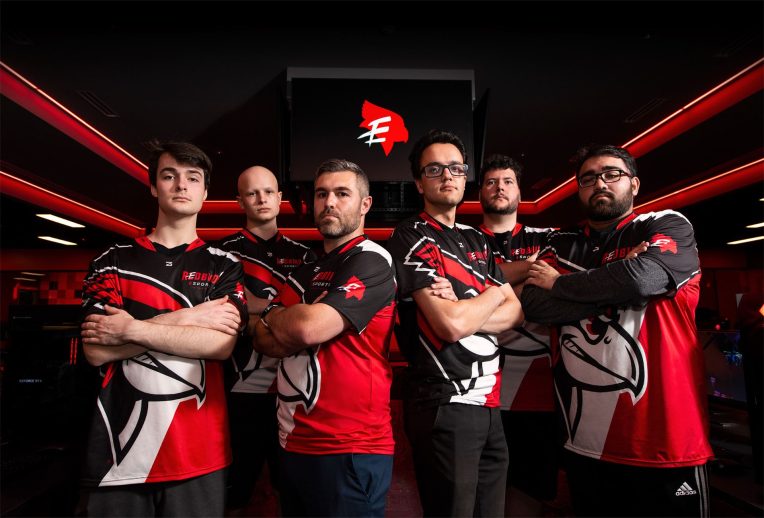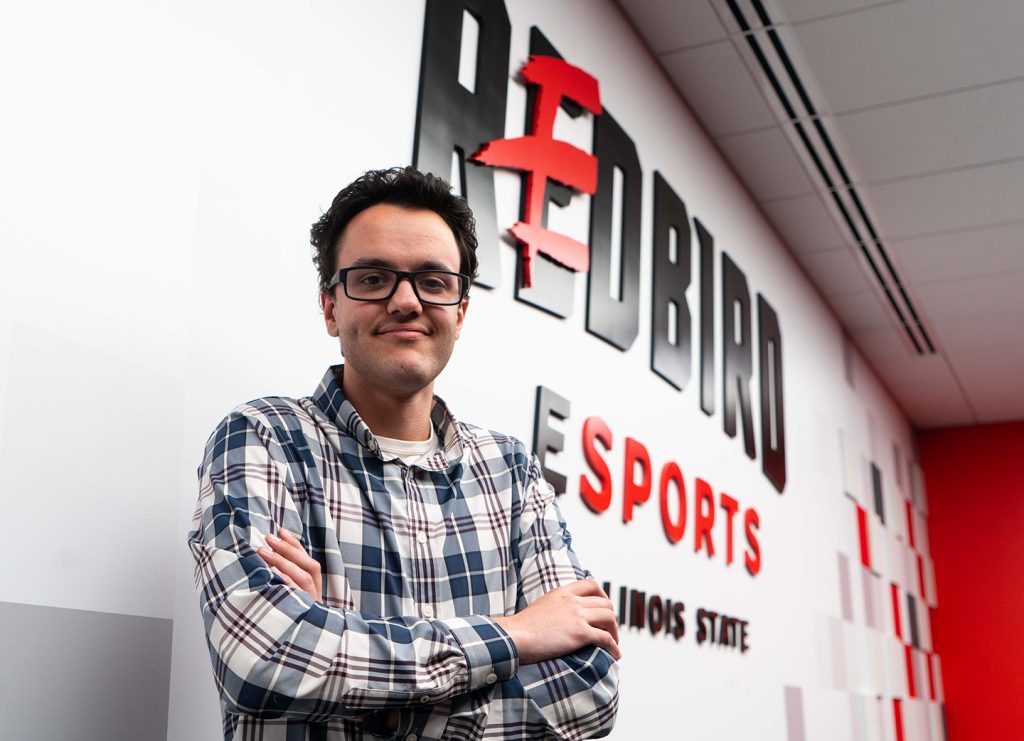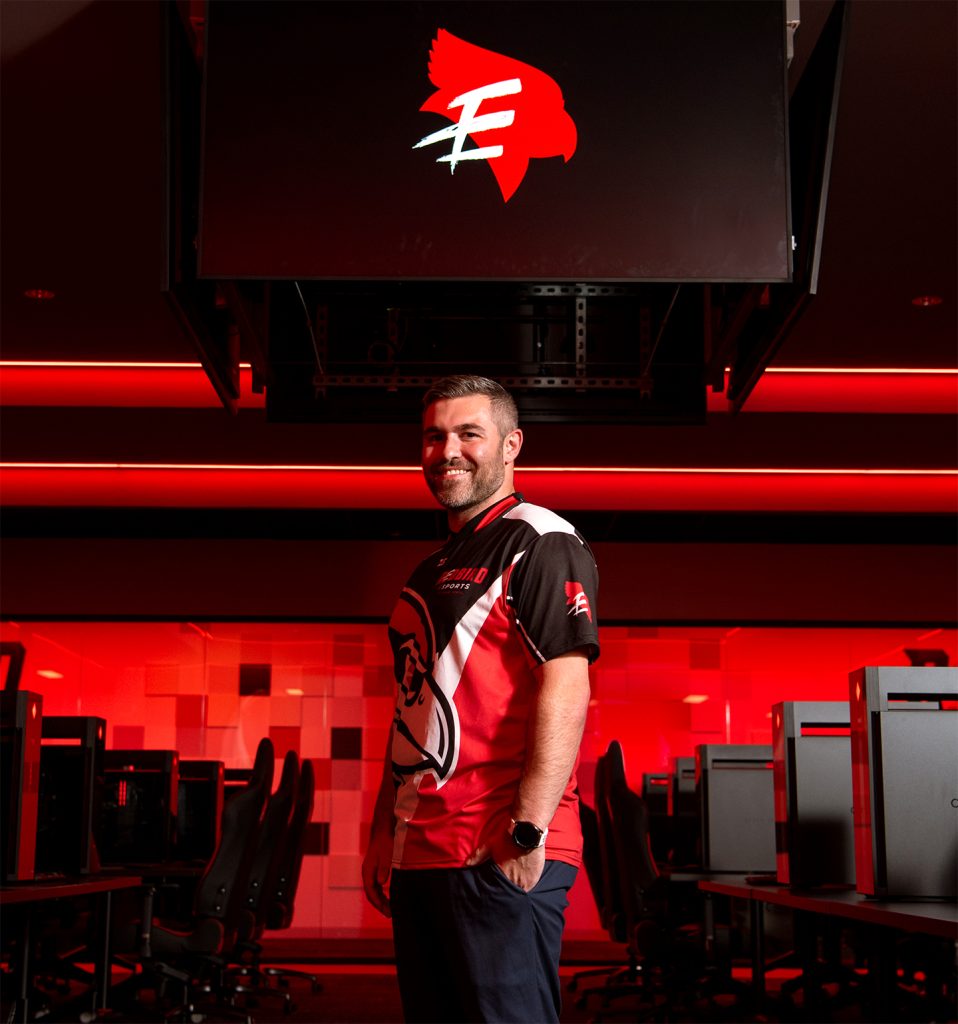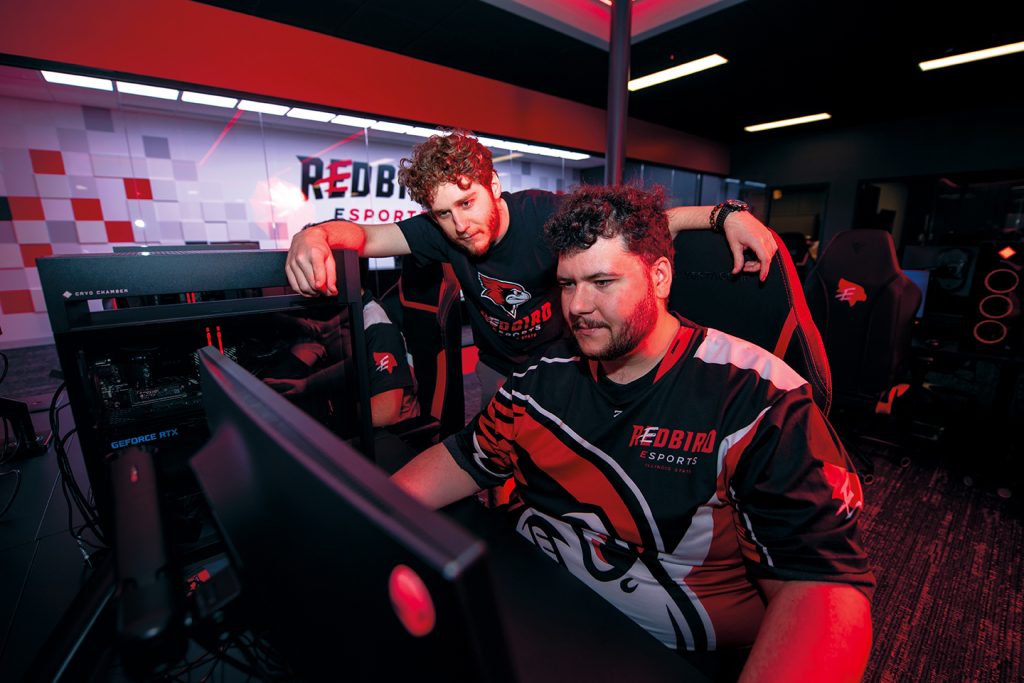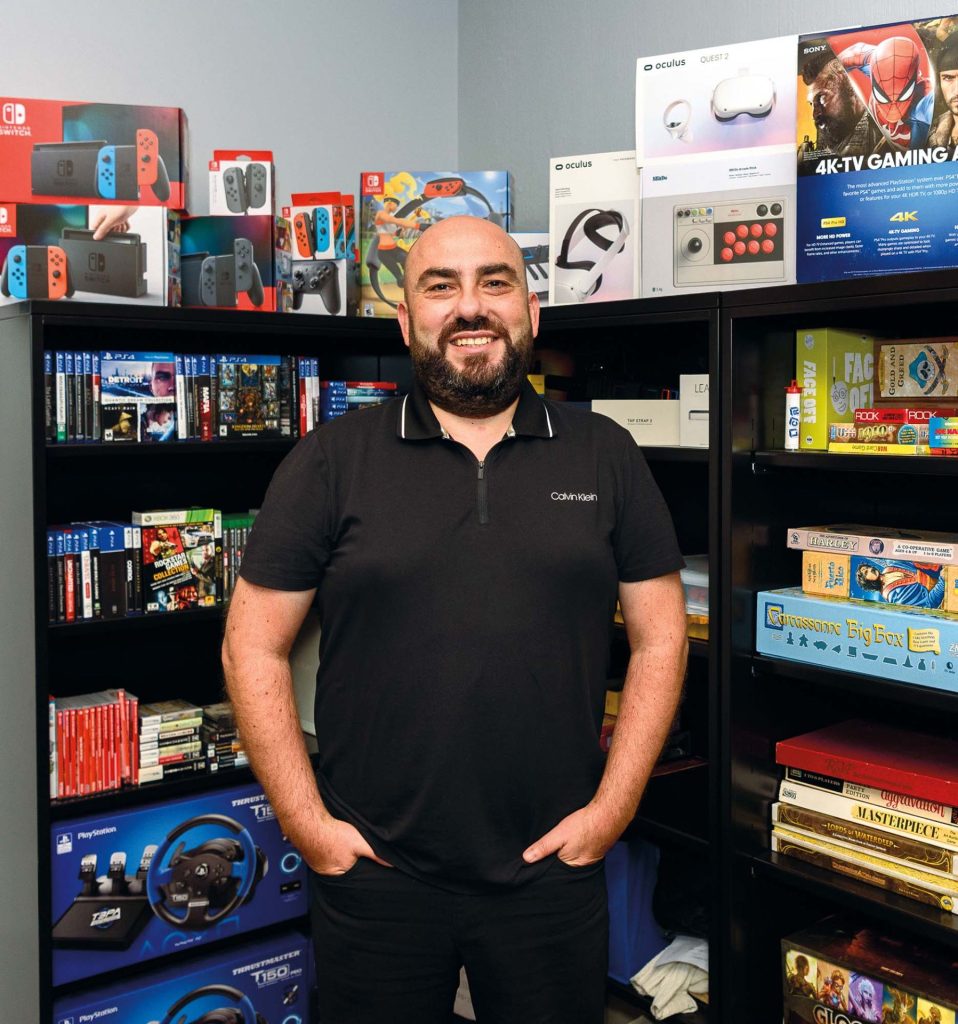In a few short years, Illinois State has built a powerhouse esports program that has made the University a destination for a massive national and international population of prospective students who may have never known about the school otherwise.
Esports Glossary
Esports: Esports are competitive video games. Through the proliferation of streaming websites and the rapid growth of the video game industry, esports has become a popular spectator sport, with some popular titles drawing thousands of viewers to arenas around the world, with millions more watching at home.
League of Legends: League of Legends, aka LoL, is a video game in which two teams of five players battle to infiltrate the other team’s side of the map with the ultimate goal of destroying the enemy team’s “Nexus,” which is a structure contained within each team’s base. Originally released in 2009, League of Legends is the most popular esport based on participation, viewership, and attendance.
Overwatch: Overwatch is a first-person action video game. Two teams of five players select from a large pool of unique characters to complete different objectives. Unlike League of Legends, which is played on a single map, Overwatch has different objectives for each of its in-game arenas. Overwatch 2 was released in October 2022 as a comprehensive update to the original game, which was first launched in 2016. Since release, Overwatch has been a staple of collegiate esports programs.
Rocket League: The video game Rocket League is like soccer mixed with a demolition derby. Players control a rocket-powered vehicle with the objective of hitting a large ball into a goal. The team that scores the most points in the allotted time wins. Originally released in 2015, Rocket League can be played by up to eight players.
“There’s a group of people on campus who have a passion around it, and if we don’t support it, then they’re going to go somewhere that does,” Jack Blahnik ’19, M.S. ’22, said.
Appears InBlahnik should know. He was one of the founders of and is the current program manager for Redbird Esports, the umbrella organization in Campus Recreation that oversees three varsity teams, 20 esports-related registered student organizations (RSOs), and two cutting-edge gaming facilities.
When Blahnik arrived at Illinois State as an undergraduate in 2016, the main esports RSO on campus had about 50 loosely organized members. He had bigger ambitions. Blahnik knew the impact esports could have on the University and wanted Illinois State to host an esports tournament in Redbird Arena.
Over the following three years, he and other students took the initiative and set about to find a space for gamers to play, with the assistance of Illinois State staff from across campus—such as Charley Edamala and Craig Jackson in Technology Solutions; Dawn Pote, M.S. ’87, in Campus Recreation; Tyler Emken in University Marketing and Communications; and Jeff Mavros, M.S. ’06, in Admissions, among others—laid the groundwork for the University’s competitive and recreational esports program.
Their hard work led to Illinois State establishing the first varsity esports program at a public higher education institution in the state in 2019. Redbird Esports has since become a brand name in collegiate competitive gaming, akin to the University of Alabama’s status in football, and an important driver of student recruitment and engagement. One in every 20 Illinois State students (about 1,200 at last count) belongs to an official Redbird Gaming RSO, and video game design is one of the University’s fastest growing degree programs.
“We are a leader in this space, even as you look nationally, and our varsity programs compete at a very high level,” said Mavros, director of Illinois State’s Office of Admissions. “We’re ranked very highly in multiple titles, including, I think, the best amateur Overwatch team that’s ever been assembled. It’s been exciting because things in higher education often move slowly. And this has been something that has really developed momentum quickly. And I think we’d seen that we could be on the cutting edge of this, and we could have an advantage in the marketplace as a result of it.”
In 2019, Illinois State opened the Digital Innovation, Graphics, and Gaming Studio (DIGGS), the University’s first high-tech computer lab designed to serve as a hub for students interested in esports. It was developed to give students like Blahnik the ability to engage with gaming RSOs at the same level as they would be able to participate in an intramural sport.
Edamala, associate vice president and chief information officer of Illinois State’s Office of Technology Solutions, often found himself watching Blahnik conduct League of Legends practices from his office in Julian Hall and was consistently impressed by what he saw.
“There was something about the way (Blahnik) held himself and how the students played the game that made me realize there’s something more to esports than what I initially thought it to be,” Edamala said. “So that’s how it started. I thought our students deserved it, and I went to bat for them.”
The same year DIGGS was opened, Blahnik delivered a presentation to then-President Larry Dietz and other campus leaders about why the University should create a formal esports program.
“We were pitching support for a varsity esports program that included a budget and what we needed to launch a program,” Blahnik said. “And by the end of the conversation—we’ll never forget this—(Dr. Dietz) said, ‘All right, what do you need?’ It’s like, ‘OK, yes, we did it.’ And from there, budget was allocated for three years, and we started getting to work on job descriptions and talking about facility design.”
Redbird Esports became one of the first public university programs in the country to excel in varsity esports. Universities, mostly smaller private institutions like Robert Morris University and Maryville University, began forming competitive esports programs in the middle of the last decade. Now, approximately 400 universities field varsity esports teams, and collegiate esports is part of a massive, and massively popular, industry. Some esports events have captured a larger viewership than the Super Bowl.
In January 2020, David Kirk, M.S. ’16, was brought in to lead Redbird Esports. Previously as a graduate student at Illinois State, he conducted research on the esports landscape and found pockets of activity at other institutions but little happening here on campus. After graduation, he took a job at the University of Akron, where he quickly established that university as a national power in esports.
In the brief time between his graduation and his return to Illinois State, collegiate esports took off. It is now one part of the $1.7 billion esports industry. Additionally, game development studios have popped up throughout the Midwest, where before they were primarily located on the coasts or overseas.
“Our program is getting students real-world career experience that is going to set them apart from others interested in going into that industry,” Kirk said. “They will be able to be more competitive and have an easier time moving into these emerging careers. The other piece to this whole concept is the video gaming industry, which is a $143 billion industry, and is larger than both the music and film industries combined. It’s common for parents to hear their child is interested in learning about radio or sports broadcasting, but they would often double take if esports were mentioned. I talk with parents frequently, educating them on the similarities in opportunities and career possibilities when their student has an interest in gaming and esports.”
“Our program is getting students real-world career experience that is going to set them apart from others interested in going into that industry.”
— David Kirk
Kirk has been a man-of-all-hats for Redbird Esports, acting as its athletics director, manager, promoter, and recruiter. Until this past summer, when the program began hiring coaches, he coached Redbird Esports’ varsity squads in League of Legends, Overwatch, and Rocket League. He also supervises Blahnik, who oversees the RSOs, which field teams in the game titles not yet at a varsity level.
“In order to address the intricacies of these games, three coaches were added to the Redbird Esports program,” Kirk said. “Each coach provides an expertise in the game while also working with our players to help them be successful inside and outside of the classroom. While our players are considered some of the best in all of North America from a competitive standpoint, our goal is to also provide them the tools and skills to be prepared for life after the game.”
Kirk credits the University for providing the support that enabled him and Blahnik to form highly successful teams, especially in League of Legends and Overwatch. Illinois State has consistently won major collegiate tournaments in both game titles. The Redbirds’ 2021 Overwatch team boasted some of the top talents on the continent, many of whom joined Overwatch League, the game’s professional ranks.
“Every single person on campus that I’ve met at any point, regardless if they’re in the executive cabinet or not, has been all for Illinois State University being a leader in collegiate esports,” Kirk said.

New Esports Facility Highlights
1. Console gaming: This space includes six screens equipped with the newest consoles for casual gaming.
2. Home Varsity Room: The Redbirds use this space outfitted with six high-end gaming PCs, customizable lighting, and a side room for strategy during home competitions.
3. Away Varsity Room: The away side features all the same amenities as the home side. (Both varsity rooms are also used for Redbird Esports camps, as well as tournament play for high school, regional, and national competition.)
4. Scoreboard: This four-sided scoreboard displays team information, game statistics, and live gameplay.
5. Gaming PCs: The main gaming area contains 72
high-end gaming PCs that are preloaded with some of the biggest game titles.
6. Broadcast room: Students will be able to hone their esports broadcasting and production skills in this space, which allows Redbird Esports to stream competitions in the highest-possible quality. The broadcast room also controls what is displayed on all the screens in the gaming area.
That support has extended to facilities for gamers, competitive or not. In addition to DIGGS, the University opened a new practice and competition lab named The Vault in fall 2020 in the Student Fitness Center. This fall, the University has unveiled a state-of-the-art gaming facility as part of a $4.5 million renovation of the Bowling and Billiards Center. The new space replaces an activity room adjacent to the bowling lanes and billiards area, which remain after having received aesthetic updates.
Kirk said any student has the ability to engage in esports and gaming at the new facility at no additional cost, whether they’re interested in playing competitively or casually.
“One of the really big benefits, and what we’re tailoring our program for, is to develop some of those social connections so that students are coming into our space,” Kirk said. “They’re not just staying in their dorm rooms playing games. The reality is they’re going to play games somewhere, so why not have them in a space where they can connect with others to develop some of those social networks so that they make those relationships and get more invested in the University, and when they leave the University, they now have lifelong friendships that they made here.”
Redbird Esports plans to hold camps and high school and collegiate tournaments in the new space and use it as a recruiting tool for the varsity teams and the University. It will also be home to the Redbird Esports Network, an entirely student-run esports startup, through which participants will gain experience in broadcasting and producing esports events for social media and online streaming channels like Twitch.
“Only when David came on board did we really think what the future could be for broadcast,” said Pote, executive director of Campus Recreation. “So the space that we’ve developed now has some intricate and amazing broadcast components to it that you’re not going to find anywhere else.”
Pote credited Blahnik’s vision for laying the groundwork of what has become a high-impact program for the University and its students.
“Jack has learned that one person with a passion can make a difference. This program in many ways is Jack’s vision,” Pote said. “The opportunity to find your connection to campus and build your social capital is the biggest impact this program has on students.”
For his part, Blahnik credits the support of his peers and mentors as well as campus administrators for helping him make his dreams a reality, including his goal of hosting a major esports event on campus. In October 2021, Illinois State held the Sixty Six Games Expo in Redbird Arena, which featured the top 16 collegiate esports League of Legends teams in the country.
“That experience was really impactful to me to see the University actually listen,” he said. “I had so many students around me from other schools trying to do the same thing and were a lot of the time unsuccessful. So what kept me here were really the people who made it happen. Because I felt like this was a place that had the vision for what esports can be, and I wanted to be part of it.”
How to support Redbird Esports
Joining the Redbird Esports Discord Server is the first and best way to engage with the program. Through Discord, Illinois State alumni and students can access information about community events and fundraising opportunities, and connect with fellow Redbirds. Prospective students can connect with the program early on in their college search, participating in events and games with current Redbirds as well as learning about the Illinois State University experience.
For more info, contact Redbird Esports at Esports@IllinoisState.edu.
Game design
Redbird Esports and a general rise in the popularity of video gaming have breathed new life into a longtime program in the Wonsook Kim College of Fine Arts. The Creative Technologies program, formerly known as Arts Technology, has seen its recruitment increase dramatically in the last few years, especially since it began to offer a sequence in video game design in fall 2021.
“Game design has been a real driving force for enrollment in the college,” said Dr. Sercan Şengün, assistant professor of Creative Technologies. “I think the pandemic cemented the place of games in our lives.”
Creative Technologies’ enrollment has more than doubled in the last six years, and about 55 percent of the program’s 205 undergraduates this fall are majoring in game design.
“(Video game design) is hugely popular,” said Jeff Mavros, M.S. ’06, director of Illinois State’s Office of Admissions. “It goes back to the interest in gaming from a young age for so many individuals, and then they want to think about a profession that can align with the skills that they’ve developed. I think it’s about being able to do something that you’re passionate about and be creative and apply business practices to it, like the game design and Creative Technologies areas offer. I see it continuing to be hugely popular.”
Şengün, a game designer and a researcher affiliated with the Massachusetts Institute of Technology’s Center for Advanced Virtuality, arrived at Illinois State in 2019 and coordinates the game design sequence, which comprises a major and a minor. The Creative Technologies program also offers sequences in interdisciplinary technologies and audio and music production with plans to offer degrees in augmented and virtual reality.
Last spring, the program graduated its first cohort of game design majors. Those seven alumni will be joined by about 40 expected graduates this school year. One of those newly minted alumni is Levi Arnett ’22, who currently manages and coaches esports professionally, and freelances in esports production. He had planned to major in computer science but decided to pursue his passion for gaming once the new sequence came online.
During his time at Illinois State, he served as an advisor with Redbird Esports and did both management and coaching for professional Apex Legends teams. He gained technical knowledge and sharpened his creative skills in the major, learning video streaming and production, website creation, and video game design using Unity and Unreal Engine software.
Arnett feels ready to work for video game studios, esports organizations, and marketing companies. “I’m a very flexible job applicant. I just feel extra prepared.”
“Game design has been a real driving force for enrollment in the college.”
— Dr. Sercan Şengün
Şengün said the game design major has three main components: video game design, production, and development. The focus is on artistic production. “To design an interesting game, to make a game look good, you have to start from the artistic side.”
Şengün said Creative Technologies and Redbirds Esports share an organic relationship. Many of the program’s majors participate in esports at some level, the academic programs utilize Redbird Esports’ facilities, and esports athletes find a natural academic fit with the game design program. Creative Technologies also partners with the School of Information Technology (IT). Game design majors are required to take some IT classes, and the game design minor is tailored to IT majors.
“The School of IT approaches this more from the lens of development and computer science; we approach it more from the lens of design, artistic production,” Şengün said.
Creative Technologies students are already collaborating with other academic units to make educational content using game environments, such as creating virtual reality tools for music composition classes and nursing laboratory simulations.
Administrators see ample opportunity for the connections between esports and academic units to grow.
“I don’t know that we’ve connected in all the ways that we can on campus with academic partnerships,” said Dawn Pote M.S. ’87, executive director of Campus Recreation. “So as we look forward, how do we work more closely with the School of Communication to potentially do more around broadcasting? How do we work more intentionally with the College of Business to have the opportunity to provide different internships and experiences?”
